The top list of academic search engines


1. Google Scholar
4. science.gov, 5. semantic scholar, 6. baidu scholar, get the most out of academic search engines, frequently asked questions about academic search engines, related articles.
Academic search engines have become the number one resource to turn to in order to find research papers and other scholarly sources. While classic academic databases like Web of Science and Scopus are locked behind paywalls, Google Scholar and others can be accessed free of charge. In order to help you get your research done fast, we have compiled the top list of free academic search engines.
Google Scholar is the clear number one when it comes to academic search engines. It's the power of Google searches applied to research papers and patents. It not only lets you find research papers for all academic disciplines for free but also often provides links to full-text PDF files.
- Coverage: approx. 200 million articles
- Abstracts: only a snippet of the abstract is available
- Related articles: ✔
- References: ✔
- Cited by: ✔
- Links to full text: ✔
- Export formats: APA, MLA, Chicago, Harvard, Vancouver, RIS, BibTeX

BASE is hosted at Bielefeld University in Germany. That is also where its name stems from (Bielefeld Academic Search Engine).
- Coverage: approx. 136 million articles (contains duplicates)
- Abstracts: ✔
- Related articles: ✘
- References: ✘
- Cited by: ✘
- Export formats: RIS, BibTeX

CORE is an academic search engine dedicated to open-access research papers. For each search result, a link to the full-text PDF or full-text web page is provided.
- Coverage: approx. 136 million articles
- Links to full text: ✔ (all articles in CORE are open access)
- Export formats: BibTeX

Science.gov is a fantastic resource as it bundles and offers free access to search results from more than 15 U.S. federal agencies. There is no need anymore to query all those resources separately!
- Coverage: approx. 200 million articles and reports
- Links to full text: ✔ (available for some databases)
- Export formats: APA, MLA, RIS, BibTeX (available for some databases)

Semantic Scholar is the new kid on the block. Its mission is to provide more relevant and impactful search results using AI-powered algorithms that find hidden connections and links between research topics.
- Coverage: approx. 40 million articles
- Export formats: APA, MLA, Chicago, BibTeX

Although Baidu Scholar's interface is in Chinese, its index contains research papers in English as well as Chinese.
- Coverage: no detailed statistics available, approx. 100 million articles
- Abstracts: only snippets of the abstract are available
- Export formats: APA, MLA, RIS, BibTeX

RefSeek searches more than one billion documents from academic and organizational websites. Its clean interface makes it especially easy to use for students and new researchers.
- Coverage: no detailed statistics available, approx. 1 billion documents
- Abstracts: only snippets of the article are available
- Export formats: not available

Consider using a reference manager like Paperpile to save, organize, and cite your references. Paperpile integrates with Google Scholar and many popular databases, so you can save references and PDFs directly to your library using the Paperpile buttons:

Google Scholar is an academic search engine, and it is the clear number one when it comes to academic search engines. It's the power of Google searches applied to research papers and patents. It not only let's you find research papers for all academic disciplines for free, but also often provides links to full text PDF file.
Semantic Scholar is a free, AI-powered research tool for scientific literature developed at the Allen Institute for AI. Sematic Scholar was publicly released in 2015 and uses advances in natural language processing to provide summaries for scholarly papers.
BASE , as its name suggest is an academic search engine. It is hosted at Bielefeld University in Germany and that's where it name stems from (Bielefeld Academic Search Engine).
CORE is an academic search engine dedicated to open access research papers. For each search result a link to the full text PDF or full text web page is provided.
Science.gov is a fantastic resource as it bundles and offers free access to search results from more than 15 U.S. federal agencies. There is no need any more to query all those resources separately!

Librarians/Admins
- EBSCOhost Collection Manager
- EBSCO Experience Manager
- EBSCO Connect
- Start your research
- EBSCO Mobile App
Clinical Decisions Users
- DynaMed Decisions
- Dynamic Health
- Waiting Rooms
- NoveList Blog
EBSCO Open Dissertations
EBSCO Open Dissertations makes electronic theses and dissertations (ETDs) more accessible to researchers worldwide. The free portal is designed to benefit universities and their students and make ETDs more discoverable.
Increasing Discovery & Usage of ETD Research
EBSCO Open Dissertations is a collaboration between EBSCO and BiblioLabs to increase traffic and discoverability of ETD research. You can join the movement and add your theses and dissertations to the database, making them freely available to researchers everywhere while increasing traffic to your institutional repository.
EBSCO Open Dissertations extends the work started in 2014, when EBSCO and the H.W. Wilson Foundation created American Doctoral Dissertations which contained indexing from the H.W. Wilson print publication, Doctoral Dissertations Accepted by American Universities, 1933-1955. In 2015, the H.W. Wilson Foundation agreed to support the expansion of the scope of the American Doctoral Dissertations database to include records for dissertations and theses from 1955 to the present.
How Does EBSCO Open Dissertations Work?
Your ETD metadata is harvested via OAI and integrated into EBSCO’s platform, where pointers send traffic to your IR.
EBSCO integrates this data into their current subscriber environments and makes the data available on the open web via opendissertations.org .
You might also be interested in:


28 Best Academic Search Engines That make your research easier
This post may contain affiliate links that allow us to earn a commission at no expense to you. Learn more

If you’re a researcher or scholar, you know that conducting effective online research is a critical part of your job. And if you’re like most people, you’re always on the lookout for new and better ways to do it.
I’m sure you are familiar with some research databases. But, top researchers keep an open mind and are always looking for inspiration in unexpected places.
This article aims to give you an edge over researchers that rely mainly on Google for their entire research process.
Our list of 28 academic search engines will start with the more familiar to less.
Table of Contents
#1. Google Scholar

Google Scholar is an academic search engine that indexes the full text or metadata of scholarly literature across an array of publishing formats and disciplines.
Great for academic research, you can use Google Scholar to find articles from academic journals, conference proceedings, theses, and dissertations. The results returned by Google Scholar are typically more relevant and reliable than those from regular search engines like Google.
Tip: You can restrict your results to peer-reviewed articles only by clicking on the “Scholarly”
- Scholarly results are typically more relevant and reliable than those from regular search engines like Google.
- You can restrict your results to peer-reviewed articles only by clicking on the “Scholarly” tab.
- Google Scholar database Coverage is extensive, with approx. 200 million articles indexed.
- Abstracts are available for most articles.
- Related articles are shown, as well as the number of times an article has been cited.
- Links to full text are available for many articles.
- Abstracts are only a snippet of the full article, so you might need to do additional searching to get the full information you need.
- Not all articles are available in full text.
Google Scholar is completely free.
#2. ERIC (Education Resources Information Center)
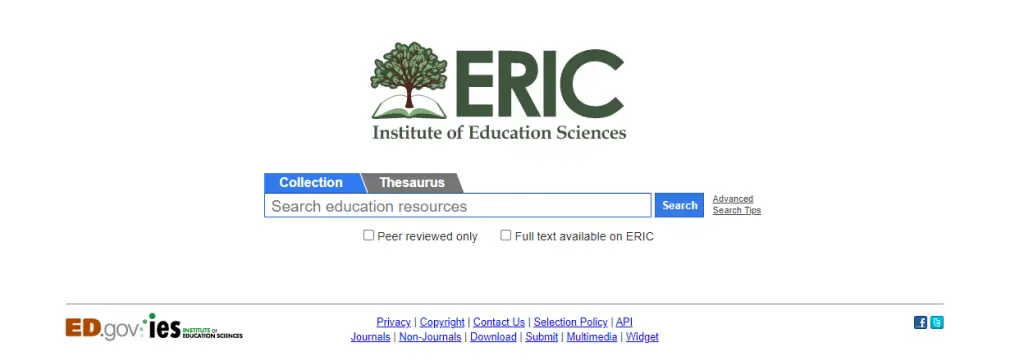
ERIC (short for educational resources information center) is a great academic search engine that focuses on education-related literature. It is sponsored by the U.S. Department of Education and produced by the Institute of Education Sciences.
ERIC indexes over a million articles, reports, conference papers, and other resources on all aspects of education from early childhood to higher education. So, search results are more relevant to Education on ERIC.
- Extensive coverage: ERIC indexes over a million articles, reports, and other resources on all aspects of education from early childhood to higher education.
- You can limit your results to peer-reviewed journals by clicking on the “Peer-Reviewed” tab.
- Great search engine for educators, as abstracts are available for most articles.
ERIC is a free online database of education-related literature.
You might also like:
- SCI Journal: Science Journal Impact Factor
- 15 Best Websites to Download Research Papers for Free
- 11 Best Academic Writing Tools For Researchers 2024
- 10 Best Reference Management Software for Research 2024
- Academic Tools
#3. Wolfram Alpha

Wolfram Alpha is a “computational knowledge engine” that can answer factual questions posed in natural language. It can be a useful search tool.
Type in a question like “What is the square root of 64?” or “What is the boiling point of water?” and Wolfram Alpha will give you an answer.
Wolfram Alpha can also be used to find academic articles. Just type in your keywords and Wolfram Alpha will generate a list of academic articles that match your query.
Tip: You can restrict your results to peer-reviewed journals by clicking on the “Scholarly” tab.
- Can answer factual questions posed in natural language.
- Can be used to find academic articles.
- Results are ranked by relevance.
- Results can be overwhelming, so it’s important to narrow down your search criteria as much as possible.
- The experience feels a bit more structured but it could also be a bit restrictive
Wolfram Alpha offers a few pricing options, including a “Pro” subscription that gives you access to additional features, such as the ability to create custom reports. You can also purchase individual articles or download them for offline use.
Pro costs $5.49 and Pro Premium costs $9.99
#4. iSEEK Education
- 15 Best Websites To Download Research Papers For Free
- 30+ Essential Software For Researchers
- 15 Best Academic Research Trend Prediction Platforms
- 15 Best Academic Networking And Collaboration Platforms
iSEEK is a search engine targeting students, teachers, administrators, and caregiver. It’s designed to be safe with editor-reviewed content.
iSEEK Education also includes a “Cited by” feature which shows you how often an article has been cited by other researchers.
- Editor-reviewed content.
- “Cited by” feature shows how often an article has been cited by other researchers.
- Limited to academic content.
- Doesn’t have the breadth of coverage that some of the other academic search engines have.
iSEEK Education is free to use.
#5. BASE (Bielefeld Academic Search Engine)
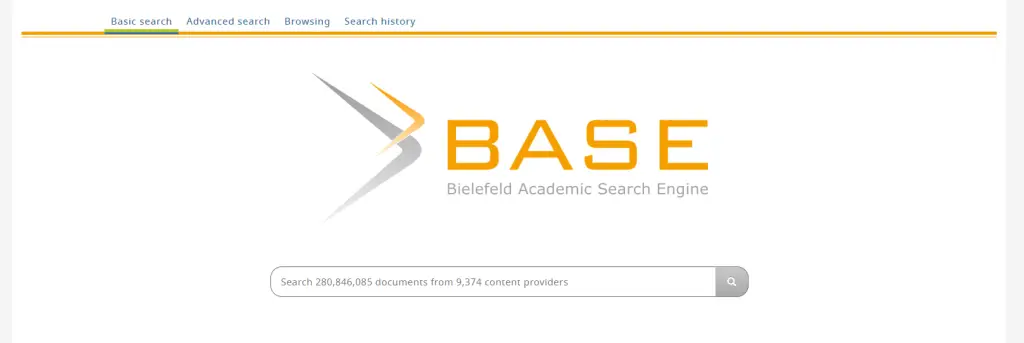
BASE is hosted at Bielefeld University in Germany and that’s where it name stems from (Bielefeld Academic Search Engine).
Known as “one of the most comprehensive academic web search engines,” it contains over 100 million documents from 4,000 different sources.
Users can narrow their search using the advanced search option, so regardless of whether you need a book, a review, a lecture, a video or a thesis, BASE has what you need.
BASE indexes academic articles from a variety of disciplines, including the arts, humanities, social sciences, and natural sciences.
- One of the world’s most voluminous search engines,
- Indexes academic articles from a variety of disciplines, especially for academic web resources
- Includes an “Advanced Search” feature that lets you restrict your results to peer-reviewed journals.
- Doesn’t include abstracts for most articles.
- Doesn’t have related articles, references, cited by
BASE is free to use.
- 10 Best Reference Management Software for Research 2023
- 15 Best Academic Networking and Collaboration Platforms
- 30+ Essential Software for Researchers
- 15 Best Academic Blogging and Content Management
- 11 Best Academic Writing Tools For Researchers
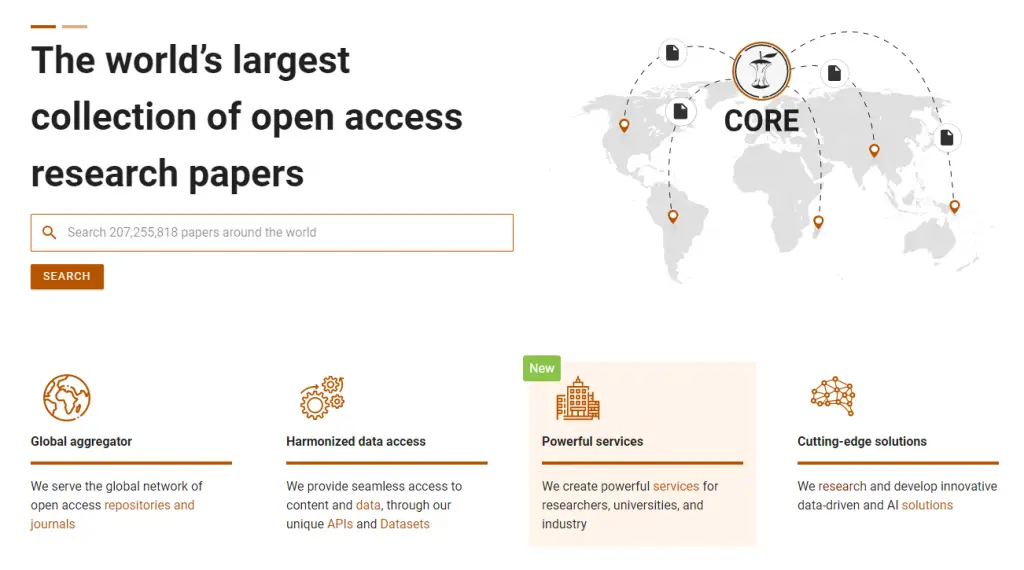
CORE is an academic search engine that focuses on open access research papers. A link to the full text PDF or complete text web page is supplied for each search result. It’s academic search engine dedicated to open access research papers.
- Focused on open access research papers.
- Links to full text PDF or complete text web page are supplied for each search result.
- Export formats include BibTeX, Endnote, RefWorks, Zotero.
- Coverage is limited to open access research papers.
- No abstracts are available for most articles.
- No related articles, references, or cited by features.
CORE is free to use.
- Best Plagiarism Checkers for Research Papers in 2024
#7. Science.gov

Science.gov is a search engine developed and managed by the United States government. It includes results from a variety of scientific databases, including NASA, EPA, USGS, and NIST.
US students are more likely to have early exposure to this tool for scholarly research.
- Coverage from a variety of scientific databases (200 million articles and reports).
- Links to full text are available for some articles.
Science.gov is free to use.
- 15 Best Academic Journal Discovery Platforms
- Sci Hub Review
#8. Semantic Scholar

Semantic Scholar is a recent entrant to the field. Its goal is to provide more relevant and effective search results via artificial intelligence-powered methods that detect hidden relationships and connections between research topics.
- Powered by artificial intelligence, which enhances search results.
- Covers a large number of academic articles (approx. 40 million).
- Related articles, references, and cited by features are all included.
- Links to full text are available for most articles.
Semantic Scholar is free to use.
- 11 Best Academic Writing Tools For Researchers
- 10 Best Reference Management Software for Research
- 15 Best Academic Journal Discovery Platforms
#9. RefSeek

RefSeek searches more than five billion documents, including web pages, books, encyclopedias, journals, and newspapers.
This is one of the free search engines that feels like Yahoo with a massive directory. It could be good when you are just looking for research ideas from unexpected angles. It could lead you to some other database that you might not know such as the CIA The World Factbook, which is a great reference tool.
- Searches more than five billion documents.
- The Documents tab is very focused on research papers and easy to use.
- Results can be filtered by date, type of document, and language.
- Good source for free academic articles, open access journals, and technical reports.
- The navigation and user experience is very dated even to millenials…
- It requires more than 3 clicks to dig up interesting references (which is how it could lead to you something beyond the 1st page of Google)
- The top part of the results are ALL ads (well… it’s free to use)
RefSeek is free to use.
#10. ResearchGate
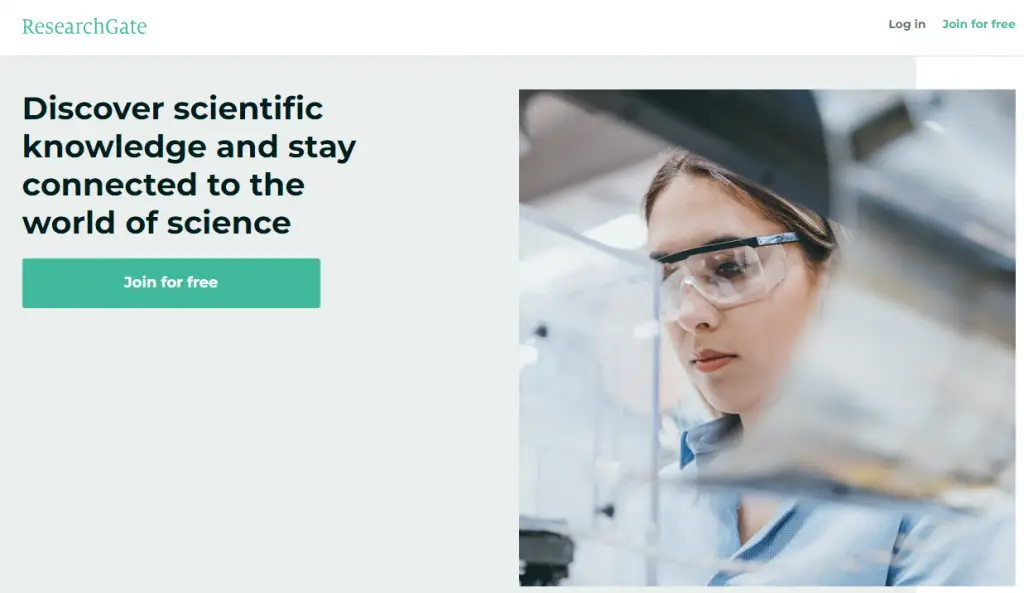
A mixture of social networking site + forum + content databases where researchers can build their profile, share research papers, and interact with one another.
Although it is not an academic search engine that goes outside of its site, ResearchGate ‘s library of works offers an excellent choice for any curious scholar.
There are more than 100 million publications available on the site from over 11 million researchers. It is possible to search by publication, data, and author, as well as to ask the researchers questions.
- A great place to find research papers and researchers.
- Can follow other researchers and get updates when they share new papers or make changes to their profile.
- The network effect can be helpful in finding people who have expertise in a particular topic.
- Interface is not as user friendly
- Can be overwhelming when trying to find relevant papers.
- Some papers are behind a paywall.
ResearchGate is free to use.
- 15 Best Academic Research Trend Prediction Platforms
- 25 Best Tools for Tracking Research Impact and Citations
#11. DataONE Search (formerly CiteULike)
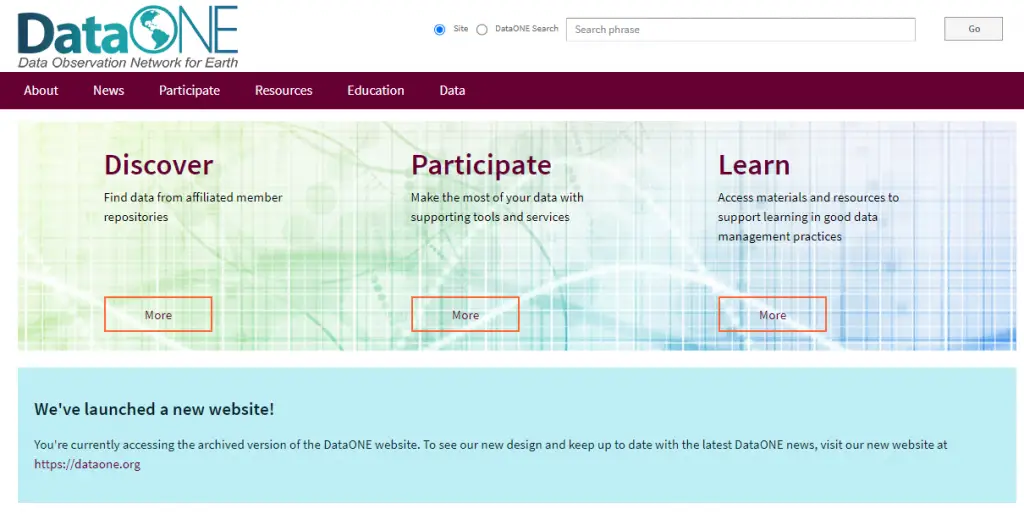
A social networking site for academics who want to share and discover academic articles and papers.
- A great place to find academic papers that have been shared by other academics.
- Some papers are behind a paywall
CiteULike is free to use.
#12. DataElixir

DataElixir is deigned to help you find, understand and use data. It includes a curated list of the best open datasets, tools and resources for data science.
- Dedicated resource for finding open data sets, tools, and resources for data science.
- The website is easy to navigate.
- The content is updated regularly
- The resources are grouped by category.
- Not all of the resources are applicable to academic research.
- Some of the content is outdated.
DataElixir is free to use.
#13. LazyScholar – browser extension
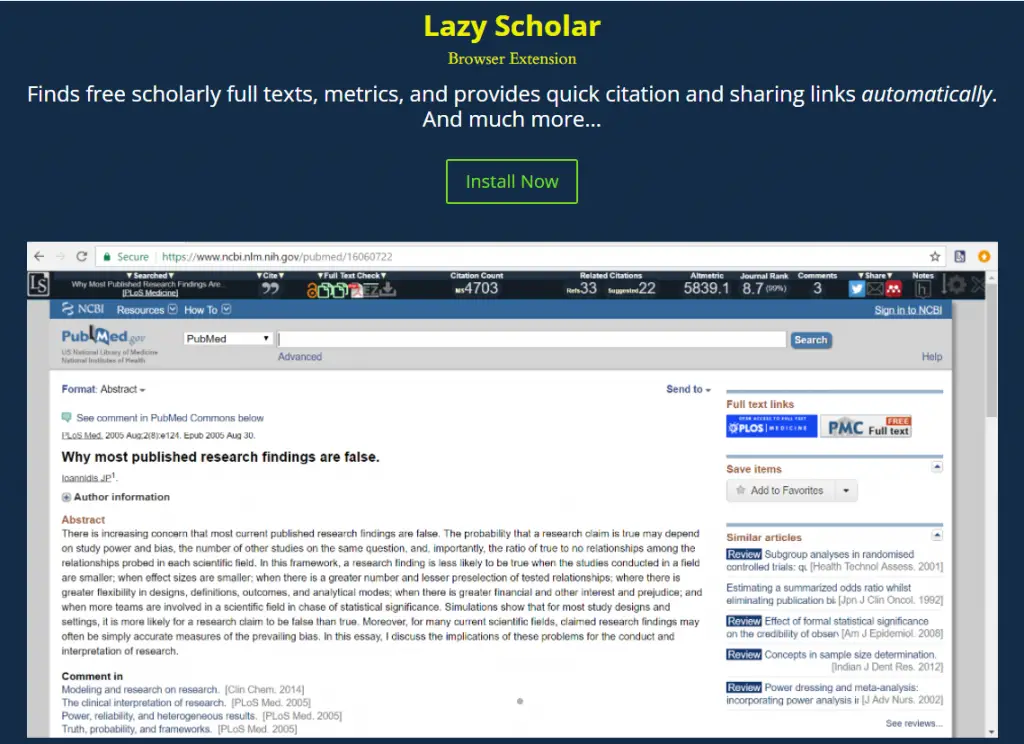
LazyScholar is a free browser plugin that helps you discover free academic full texts, metrics, and instant citation and sharing links. Lazy Scholar is created Colby Vorland, a postdoctoral fellow at Indiana University.
- It can integrate with your library to find full texts even when you’re off-campus.
- Saves your history and provides an interface to find it.
- A pre-formed citation is availlable in over 900 citation styles.
- Can recommend you topics and scans new PubMed listings to suggest new papers
- Results can be a bit hit or miss
LazyScholar is free to use.
#14. CiteseerX – digital library from PenState

CiteseerX is a digital library stores and indexes research articles in Computer Science and related fields. The site has a robust search engine that allows you to filter results by date, author.
- Searches a large number of academic papers.
- Results can be filtered by date, author, and topic.
- The website is easy to use.
- You can create an account and save your searches for future reference.
CiteseerX is free to use.
- Surfer Review: Is It Worth It?
- 25 Best Tools For Tracking Research Impact And Citations
#15. The Lens – patents search
The Lens or the Patent Lens is an online patent and scholarly literature search facility, provided by Cambia, an Australia-based non-profit organization.

- Searches for a large number of academic papers.
The price range can be free for non-profit use to $5,000 for commercial enterprise.
#16. Fatcat – wiki for bibliographic catalog
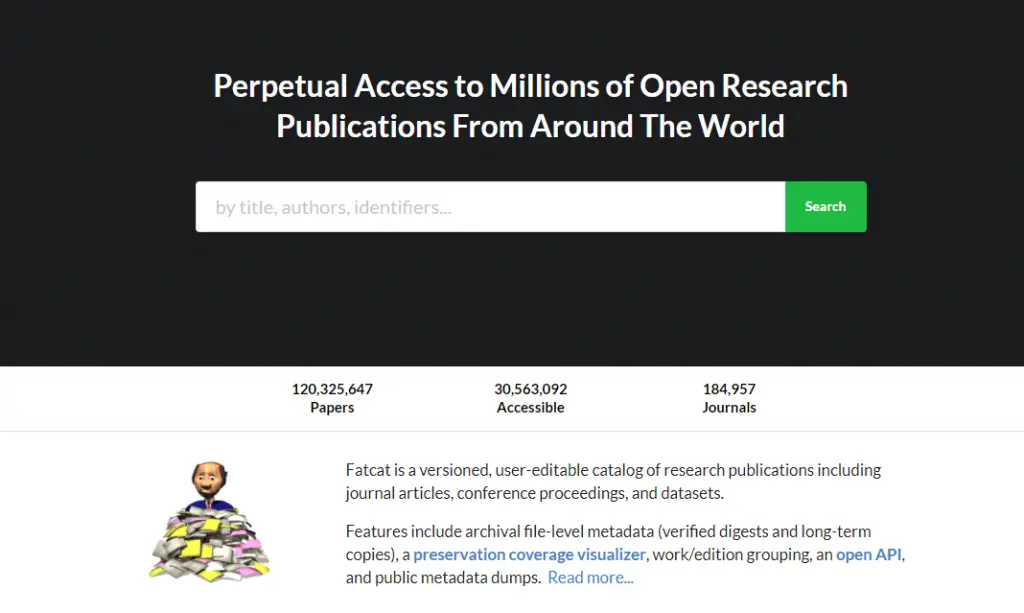
Fatcat is an open bibliographic catalog of written works. The scope of works is somewhat flexible, with a focus on published research outputs like journal articles, pre-prints, and conference proceedings. Records are collaboratively editable, versioned, available in bulk form, and include URL-agnostic file-level metadata.
- Open source and collaborative
- You can be part of the community that is very focused on its mission
- The archival file-level metadata (verified digests and long-term copies) is a great feature.
- Could prove to be another rabbit hole
- People either love or hate the text-only interface
#17. Lexis Web – Legal database
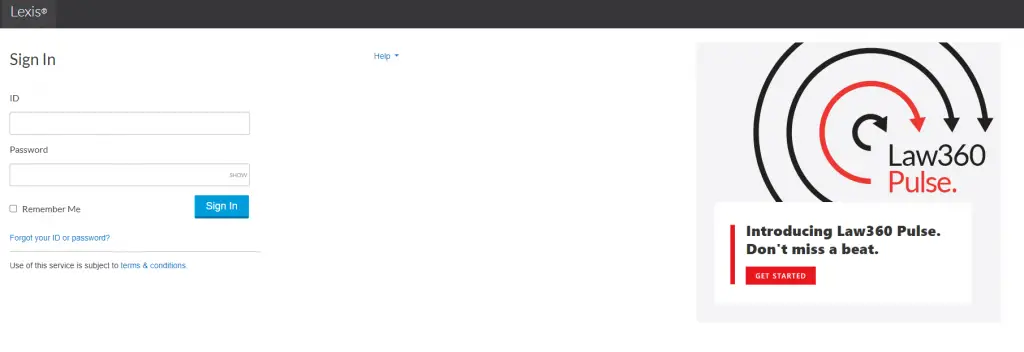
Are you researching legal topics? You can turn to Lexis Web for any law-related questions you may have. The results are drawn from legal sites and can be filtered based on criteria such as news, blogs, government, and commercial. Additionally, users can filter results by jurisdiction, practice area, source and file format.
- Results are drawn from legal sites.
- Filters are available based on criteria such as news, blogs, government, and commercial.
- Users can filter results by jurisdiction, practice area, source and file format.
- Not all law-related questions will be answered by this search engine.
- Coverage is limited to legal sites only.
Lexis Web is free for up to three searches per day. After that, a subscription is required.
#18. Infotopia – part of the VLRC family
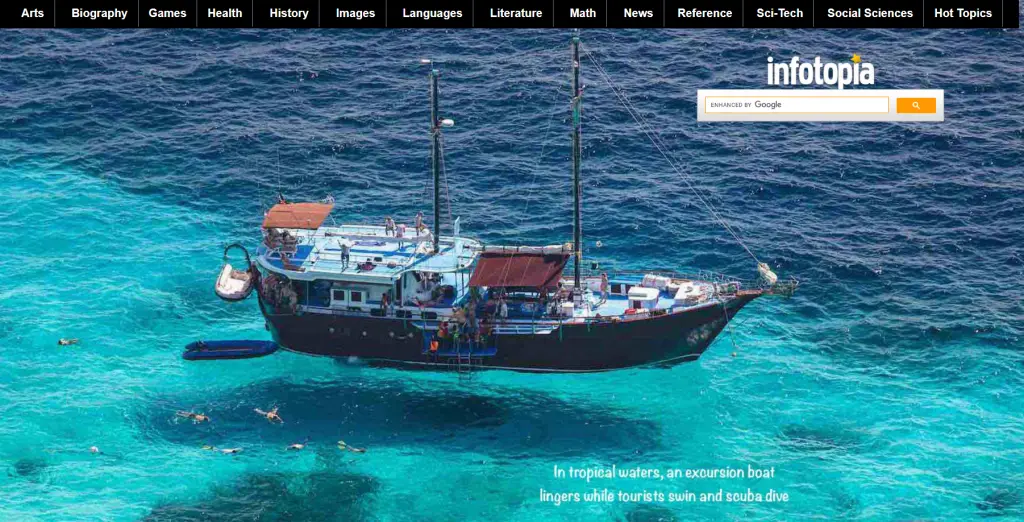
Infotopia touts itself as an “alternative to Google safe search.” Scholarly book results are curated by librarians, teachers, and other educational workers. Users can select from a range of topics such as art, health, and science and technology, and then see a list of resources pertaining to the topic.
Consequently, if you aren’t able to find what you are looking for within Infotopia’s pages, you will probably find it on one of its many suggested websites.
#19. Virtual Learning Resources Center
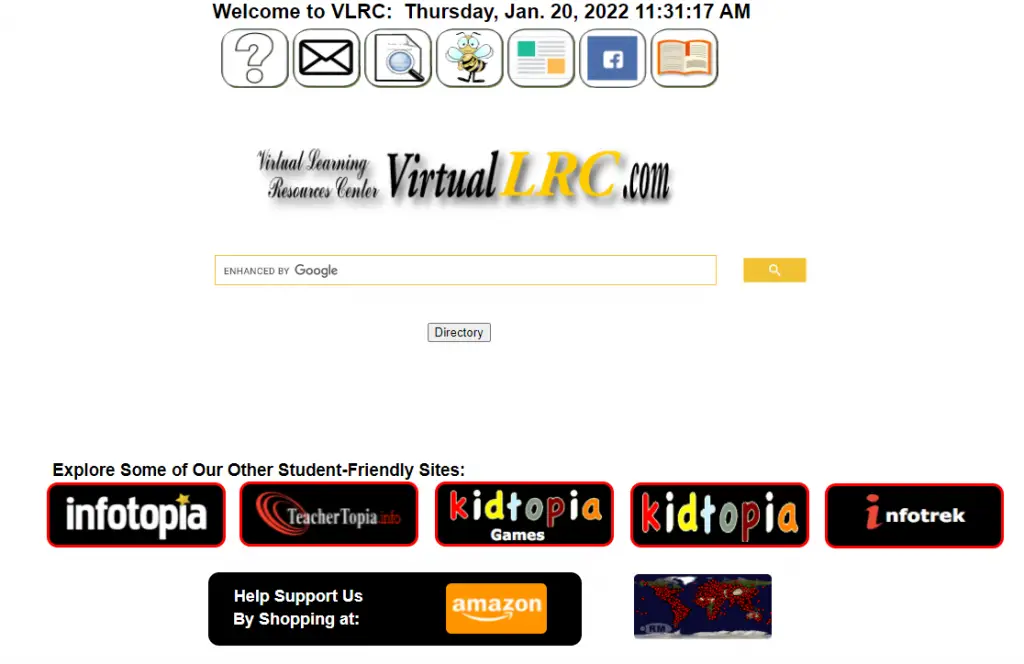
Virtual Learning Resources Center (VLRC) is an academic search engine that features thousands of academic sites chosen by educators and librarians worldwide. Using an index generated from a research portal, university, and library internet subject guides, students and instructors can find current, authoritative information for school.
- Thousands of academic information websites indexed by it. You will also be able to get more refined results with custom Google search, which will speed up your research.
- Many people consider VLRC as one of the best free search engines to start looking for research material.
- TeachThought rated the Virtual LRC #3 in it’s list of 100 Search Engines For Academic Research
- More relevant to education
- More relevant to students

Powered by Google Custom Search Engine (CSE), Jurn is a free online search engine for accessing and downloading free full-text scholarly papers. It was created by David Haden in a public open beta version in February 2009, initially for locating open access electronic journal articles in the arts and humanities.
After the indexing process was completed, a website containing additional public directories of web links to indexed publications was introduced in mid-2009. The Jurn search service and directory has been regularly modified and cleaned since then.
- A great resource for finding academic papers that are behind paywalls.
- The content is updated regularly.uren
Jurn is free to use.
#21. WorldWideScience
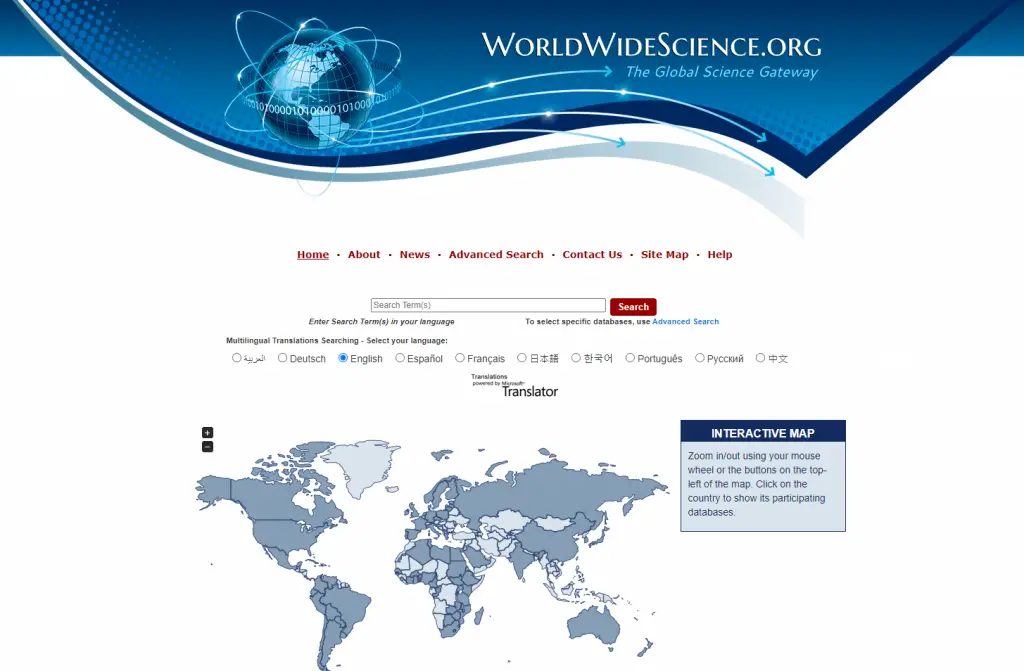
The Office of Scientific and Technical Information—a branch of the Office of Science within the U.S. Department of Energy—hosts the portal WorldWideScience , which has dubbed itself “The Global Science Gateway.”
Over 70 countries’ databases are used on the website. When a user enters a query, it contacts databases from all across the world and shows results in both English and translated journals and academic resources.
- Results can be filtered by language and type of resource
- Interface is easy to use
- Contains both academic journal articles and translated academic resources
- The website can be difficult to navigate.
WorldWideScience is free to use.
#22. Google Books
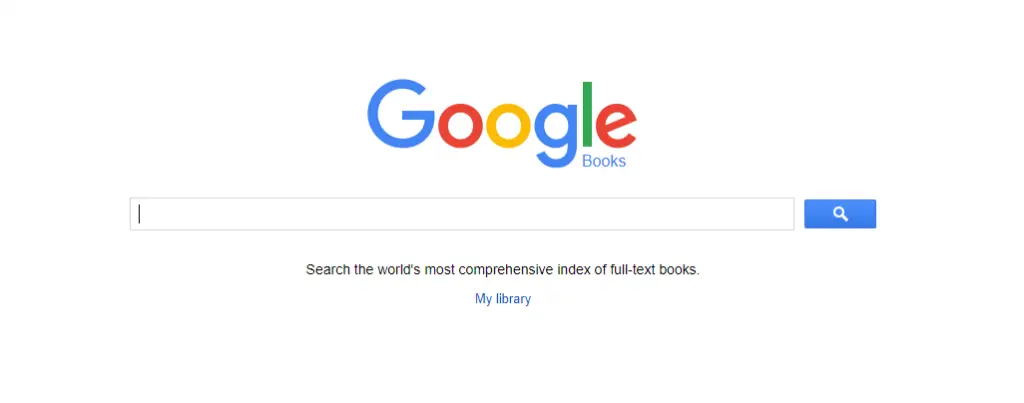
A user can browse thousands of books on Google Books, from popular titles to old titles, to find pages that include their search terms. You can look through pages, read online reviews, and find out where to buy a hard copy once you find the book you are interested in.
#23. DOAJ (Directory of Open Access Journals)
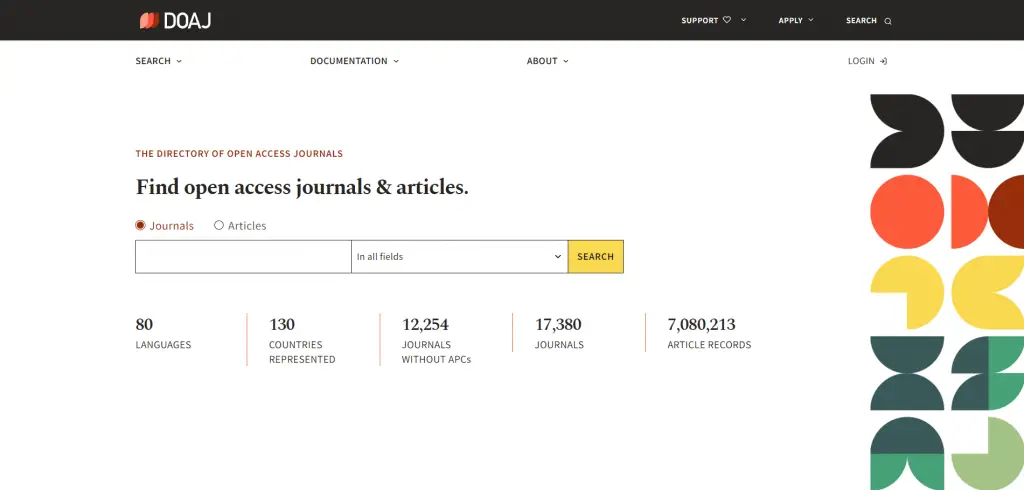
DOAJ is a free search engine for scientific and scholarly materials. It is a searchable database with over 8,000 peer-reviewed research papers organized by subject. It’s one of the most comprehensive libraries of scientific and scholarly resources, with over 8,000 journals available on a variety of themes.
#24. Baidu Scholar

Baidu Xueshu (Academic) is the Chinese version for Google Scholar. IDU Scholar indexes academic papers from a variety of disciplines in both Chinese and English.
- Articles are available in full text PDF.
- Covers a variety of academic disciplines.
- No abstracts are available for most articles, but summaries are provided for some.
- A great portal that takes you to different specialized research platform
- You need to be able to read Chinese to use the site
- Since 2021 there is a rise of focus on China and the Chinese Communist Party
Baidu Scholar is free to use.
#25. PubMed Central
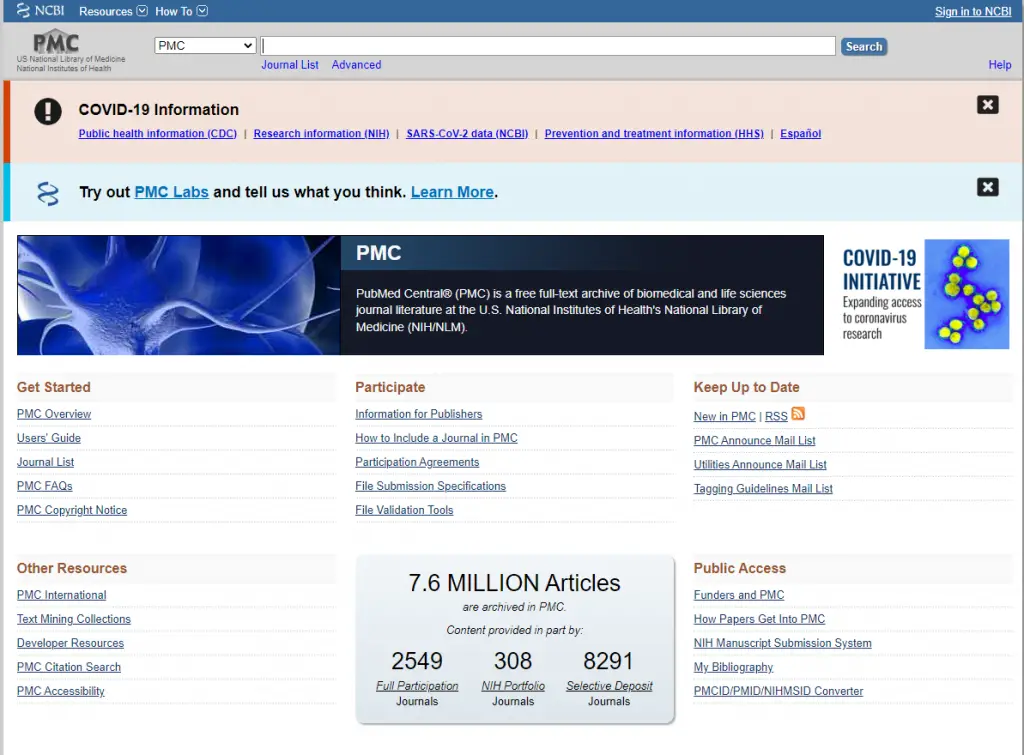
PubMed is a free search engine that provides references and abstracts for medical, life sciences, and biomedical topics.
If you’re studying anything related to healthcare or science, this site is perfect. PublicMed Central is operated by the National Center for Biotechnology Information, a division of the U.S. National Library of Medicine. It contains more than 3 million full-text journal articles.
It’s similar to PubMed Health, which focuses on health-related research and includes abstracts and citations to over 26 million articles.
#26. MEDLINE®
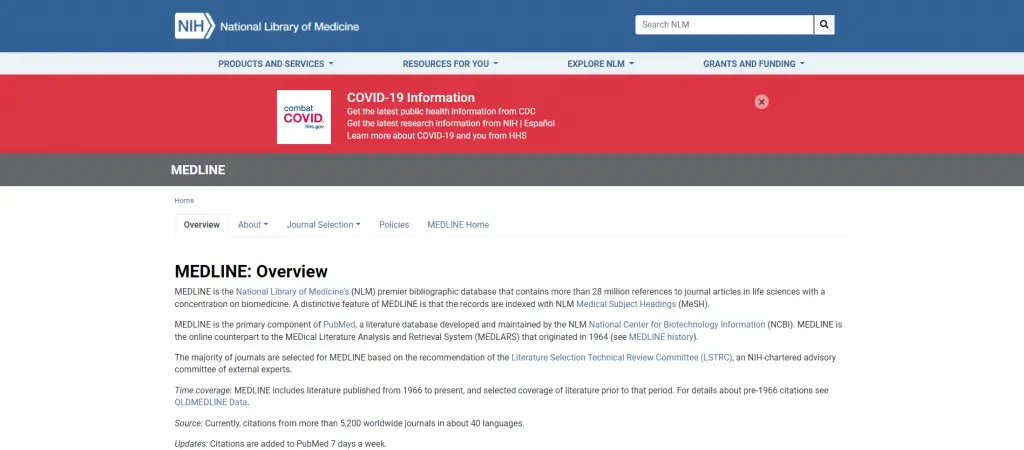
MEDLINE® is a paid subscription database for life sciences and biomedicine that includes more than 28 million citations to journal articles. For finding reliable, carefully chosen health information, Medline Plus provides a powerful search tool and even a dictionary.
- A great database for life sciences and biomedicine.
- Contains more than 28 million references to journal articles.
- References can be filtered by date, type of document, and language.
- The database is expensive to access.
- Some people find it difficult to navigate and find what they are looking for.
MEDLINE is not free to use ( pricing information ).
Defunct Academic Search Engines
#27. microsoft academic .
Microsoft Academic
Microsoft Academic Search seemed to be a failure from the beginning. It ended in 2012, then re-launched in 2016 as Microsoft Academic. It provides the researcher with the opportunity to search academic publications,
Microsoft Academic used to be the second-largest academic search engine after Google Scholar. Microsoft Academic provides a wealth of data for free, but Microsoft has announced that it will shut Microsoft Academic down in by 2022.
#28. Scizzle
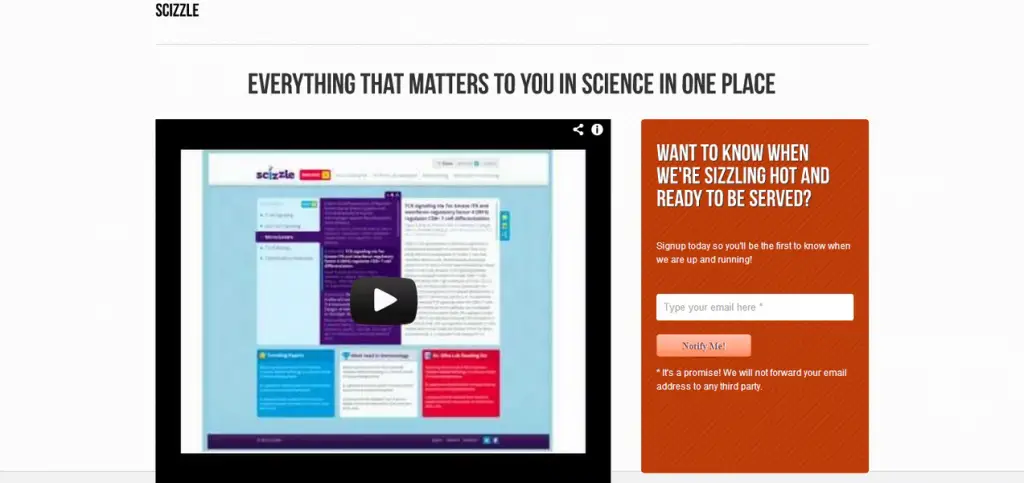
Designed to help researchers stay on top of the literature by setting up email alerts, based on key terms, for newspapers.
Unfortunately, academic search engines come and go. These are two that are no longer available.
Final Thoughts
There are many academic search engines that can help researchers and scholars find the information they need. This list provides a variety of options, starting with more familiar engines and moving on to less well-known ones.
Keeping an open mind and exploring different sources is essential for conducting effective online research. With so much information at our fingertips, it’s important to make sure we’re using the best tools available to us.
Tell us in the comment below which academic search engine have you not heard of? Which database do you think we should add? What database do your professional societies use? What are the most useful academic websites for research in your opinion?
There is more.
Check out our other articles on the Best Academic Tools Series for Research below.
- Learn how to get more done with these Academic Writing Tools
- Learn how to proofread your work with these Proofreading Tools
- Learn how to broaden your research landscape with these Academic Search Engines
- Learn how to manage multiple research projects with these Project Management Tools
- Learn how to run effective survey research with these Survey Tools for Research
- Learn how get more insights from important conversations and interviews with Transcription Tools
- Learn how to manage the ever-growing list of references with these Reference Management Software
- Learn how to double your productivity with literature reviews with these AI-Based Summary Generators
- Learn how to build and develop your audience with these Academic Social Network Sites
- Learn how to make sure your content is original and trustworthy with these Plagiarism Checkers
- Learn how to talk about your work effectively with these Science Communication Tools
10 thoughts on “28 Best Academic Search Engines That make your research easier”
Thank you so much Joannah..I have found this information useful to me as librarian in an academic library
You are welcome! We are happy to hear that!
Thank You Team, for providing a comprehensive list of academic search engines that can help make research easier for students and scholars. The variety of search engines included offers a range of options for finding scholarly articles, journals, and other academic resources. The article also provides a brief summary of each search engine’s features, which helps in determining which one is the best fit for a specific research topic. Overall, this article is a valuable resource for anyone looking for a quick and easy way to access a wealth of academic information.
Thank you for taking the time to share your feedback with us. We are delighted to hear that you found our list of academic search engines helpful in making research easier for students and scholars. We understand the importance of having a variety of options when it comes to finding scholarly articles, journals, and other academic resources, and we strive to provide a comprehensive list of resources to meet those needs.
We are glad that you found the brief summary of each search engine’s features helpful in determining which one is the best fit for a specific research topic. Our goal is to make it easy for our readers to access valuable academic information and we’re glad that we were able to achieve that for you.
We appreciate your support and thank you for your kind words. We will continue to provide valuable resources for students and researchers in the future. Please let us know if you have any further questions or suggestions.
No more questions Thank You
I cannot thank you enough!!! thanks alot 🙂
Typography animation is a technique that combines text and motion to create visually engaging and dynamic animations. It involves animating individual letters, words, or phrases in various ways to convey a message, evoke emotions, or enhance the visual impact of a design or video. – Typography Animation Techniques Tools and Online Software {43}
Hi Joannah! Here’s another one you may want to add! Expontum ( https://www.expontum.com/ ) – Helps researchers quickly find knowledge gaps and identify what research projects have been completed before. Thanks!
Expontum – Helps researchers quickly find knowledge gaps and identify what research projects have been completed before. Expontum is free, open access, and available to all globally with no paid versions of the site. Automated processes scan research article information 24/7 so this website is constantly updating. By looking at over 35 million research publications (240 million by the end of 2023), the site has 146 million tagged research subjects and 122 million tagged research attributes. Learn more about methodology and sources on the Expontum About Page ( https://www.expontum.com/about.php )
Hey Ryan, I clicked and checked your site and thought it was very relevant to our reader. Thank you for sharing. And, we will be reviewing your site soon.
Sounds good! Thanks, Joannah!
Leave a Comment Cancel reply
Save my name, email, and website in this browser for the next time I comment.
We maintain and update science journals and scientific metrics. Scientific metrics data are aggregated from publicly available sources. Please note that we do NOT publish research papers on this platform. We do NOT accept any manuscript.
2012-2024 © scijournal.org
🇺🇦 make metadata, not war
A comprehensive bibliographic database of the world’s scholarly literature
The world’s largest collection of open access research papers, machine access to our vast unique full text corpus, core features, indexing the world’s repositories.
We serve the global network of repositories and journals
Comprehensive data coverage
We provide both metadata and full text access to our comprehensive collection through our APIs and Datasets
Powerful services
We create powerful services for researchers, universities, and industry
Cutting-edge solutions
We research and develop innovative data-driven and AI solutions
Committed to the POSI
Cost-free PIDs for your repository
OAI identifiers are unique identifiers minted cost-free by repositories. Ensure that your repository is correctly configured, enabling the CORE OAI Resolver to redirect your identifiers to your repository landing pages.
OAI IDs provide a cost-free option for assigning Persistent Identifiers (PIDs) to your repository records. Learn more.
Who we serve?
Enabling others to create new tools and innovate using a global comprehensive collection of research papers.

“ Our partnership with CORE will provide Turnitin with vast amounts of metadata and full texts that we can ... ” Show more
Gareth Malcolm, Content Partner Manager at Turnitin
Academic institutions.
Making research more discoverable, improving metadata quality, helping to meet and monitor open access compliance.

“ CORE’s role in providing a unified search of repository content is a great tool for the researcher and ex... ” Show more
Nicola Dowson, Library Services Manager at Open University
Researchers & general public.
Tools to find, discover and explore the wealth of open access research. Free for everyone, forever.

“ With millions of research papers available across thousands of different systems, CORE provides an invalu... ” Show more
Jon Tennant, Rogue Paleontologist and Founder of the Open Science MOOC
Helping funders to analyse, audit and monitor open research and accelerate towards open science.
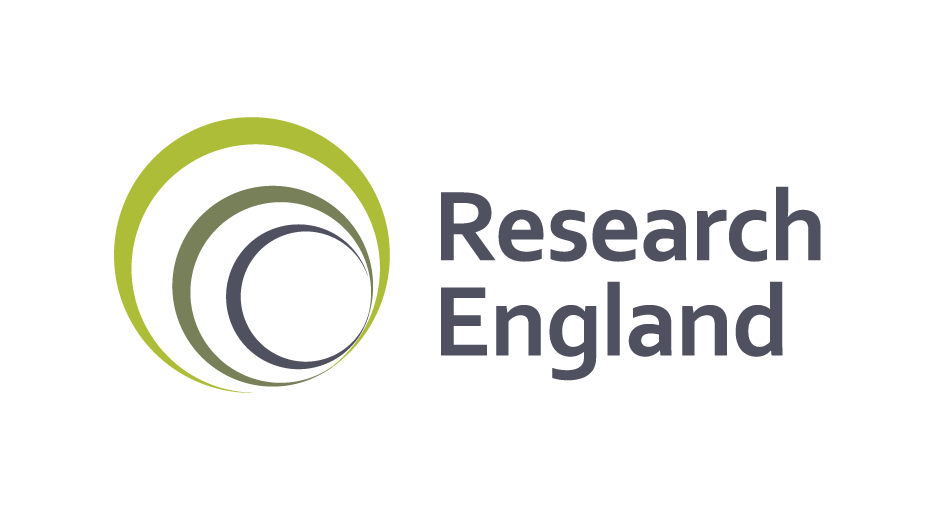
“ Aggregation plays an increasingly essential role in maximising the long-term benefits of open access, hel... ” Show more
Ben Johnson, Research Policy Adviser at Research England
Our services, access to raw data.
Create new and innovative solutions.
Content discovery
Find relevant research and make your research more visible.
Managing content
Manage how your research content is exposed to the world.
Companies using CORE

Gareth Malcolm
Content Partner Manager at Turnitin
Our partnership with CORE will provide Turnitin with vast amounts of metadata and full texts that we can utilise in our plagiarism detection software.
Academic institution using CORE
Kathleen Shearer
Executive Director of the Confederation of Open Access Repositories (COAR)
CORE has significantly assisted the academic institutions participating in our global network with their key mission, which is their scientific content exposure. In addition, CORE has helped our content administrators to showcase the real benefits of repositories via its added value services.
Partner projects


Ben Johnson
Research Policy Adviser
Aggregation plays an increasingly essential role in maximising the long-term benefits of open access, helping to turn the promise of a 'research commons' into a reality. The aggregation services that CORE provides therefore make a very valuable contribution to the evolving open access environment in the UK.
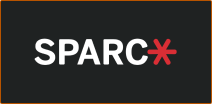
Stand on the shoulders of giants
Google Scholar provides a simple way to broadly search for scholarly literature. From one place, you can search across many disciplines and sources: articles, theses, books, abstracts and court opinions, from academic publishers, professional societies, online repositories, universities and other web sites. Google Scholar helps you find relevant work across the world of scholarly research.

How are documents ranked?
Google Scholar aims to rank documents the way researchers do, weighing the full text of each document, where it was published, who it was written by, as well as how often and how recently it has been cited in other scholarly literature.
Features of Google Scholar
- Search all scholarly literature from one convenient place
- Explore related works, citations, authors, and publications
- Locate the complete document through your library or on the web
- Keep up with recent developments in any area of research
- Check who's citing your publications, create a public author profile

Disclaimer: Legal opinions in Google Scholar are provided for informational purposes only and should not be relied on as a substitute for legal advice from a licensed lawyer. Google does not warrant that the information is complete or accurate.
- Privacy & Terms
- Skip to search
- Skip to main navigation
- Skip to footer navigation
- Login Logged in as Username Log Out
- Français
- Español
- Ελληνικά
Basic Search

- Info for...
- MyOHIO Student Center
- Visit Athens Campus
- Regional Campuses
- OHIO Online
- Faculty/Staff Directory
University Libraries
- Athens Campus Directions & Parking
- Alden Library
- Music & Dance Library
- Regional Campus Libraries
- Staff Directory
- Subject Librarians & Archivists
- Organizational Chart
- Other Units in Alden
- Policies & Guidelines
- Strategic Plan
- Diversity, Equity, Inclusion and Accessibility (DEIA)
- Current News & Events
- Events Series
- Archives & Special Collections
- Fine Arts Library
- Government Documents
- International Collections
- Search General Collections
- Digital Archives
- OHIO Open Library
- ArticlesPlus
- Borrowing at a Glance
- Interlibrary Loan & Document Express
- Course Reserves
- Faculty and Staff Delivery Services
- Study & Learn
- Study & Meeting Rooms
- Technology & Printing
- Writing & Tutoring
- Remote Library Services
- By Population
- Graduate Students
- Undergraduate Students
- Persons with Disabilities
- ALICE Library Catalog
- OhioLINK Catalog
- Databases A to Z
- Find E-Journals
Dissertations & Theses
- Films & Videos
- Journals & Scholarly Articles
- Cite Your Sources
- Library Guides
- Scholarly Communication
- Your Subject Librarians & Archivists
- My Library Account
- My Interlibrary Loan Account
Helpful Links
Navigate OHIO
Connect With Us
Use the resources below to find theses and dissertations. These tools can also be used to find theses or dissertations written by Ohio University students .
ProQuest Dissertations & Theses A&I
The ProQuest Dissertations & Theses A&I database covers well over 2 million doctoral dissertations and masters theses from around the world. The complete database includes citations going back to the year 1637. The type of coverage and availability of full text, however, varies by date:
- 1938-1980: Alden Library has a set of microfilms (on the 1st floor ) which does include abstracts.
- 1988 to the present: includes Masters theses with abstracts
- 24-page free previews available for most documents
- Free access to full text of ALL Ohio University theses and dissertations
OhioLINK ETD Center
The OhioLINK Electronic Theses and Dissertations Center includes citations, abstracts and in most cases full text of theses and dissertations written at member institutions since 2000. The full text of theses and dissertations is in PDF format and is freely available to anyone.
- The site also includes instructions for authors on how to create and submit their electronic thesis or dissertation.
- You can also browse ETDs by school and department by doing an Advanced Search .
Other Resources
DART-Europe E-Theses Portal
- Search engine for full-text theses from more than 200 universities in more than a dozen European countries .
Networked Digital Library of Theses and Dissertations (NDLTD)
- An “international organization dedicated to promoting the adoption, creation, use, dissemination, and preservation of electronic theses and dissertations (ETDs).” The search engine includes millions of electronic theses and dissertations. For more information, see the main website .
Open Access Theses and Dissertations (OATD)
- “Aims to be the best possible resource for finding open access graduate theses and dissertations published around the world.” Here is a selected list of contributing institutions .
- Provides the full text of open access dissertations and theses free of charge.
WorldCat Advanced Search
- WorldCat contains records from thousands of libraries around the world.
- Use the "Limit Results by" option to "Content: Thesis/dissertation."
Ohio University Libraries

Students and staff
- Databases for QUT students and staff
- Get started
- Start your research on the web?
- Using the Library Search
- Researching by study area
- Finding information by type
- Books and ebooks
- Journals and magazines
- Newspapers and news media
- Aboriginal and Torres Strait Islander resources
- Readings and textbooks
- Classroom and curriculum resources
- Company information
- Evidence based information
- Industry reports and market research
- Legal materials
- Novels and recreational reading
- Statistics and country data
- Borrow and request
- Known issues and outages

Find databases, specialist search engines and repositories to search for theses.
I've got a Phd! by Ed Brambley is licensed under CC BY-SA 2.0 . Image cropped.
Library Search is not recommended for finding theses as part of a literature review as it only includes theses from ProQuest Dissertations and Theses Global and QUT Theses , and only where fulltext is available online.
For a general search of available theses, start with one of the following Library databases:
Search engines and repositories
The majority of recently published theses are freely available on open access repositories and many older theses are being digitised and made available online. Using a specialist search engine along with major repositories provides good coverage for a comprehensive theses search.
Recommended search engines:
- BASE (Bielefeld Academic Search Engine) - Ensure only the Theses option is ticked. If a link to fulltext fails try the Google Scholar option in the record to see if an alternative source is available.
- Google Scholar - Although searches cannot be limited to theses, Google Scholar is an effective search tool for finding a specific thesis.
The following repositories aggregate thesis records from universities and other research institutions:
- Networked Digital Library of Theses and Dissertations (NDLTD) - A large thesis index with links to many fulltext records. Note: If you find a broken link on NDLTD try searching Google Scholar for the fulltext.
- DART-Europe E-theses Portal - Theses published in the European Union.
- British Library EThOS - Theses published by most UK universities. Registration is required to download.
- NZResearch.org.nz - The most comprehensive search of New Zealand theses. Change the Resources Type to Specific Types and tick Theses .
- Theses Canada - Theses published by most Canadian universities.
Can't find fulltext?
If you can't find the fulltext of a thesis online, request it via Document delivery and we'll attempt to obtain a copy for you.
Global links and information
- Databases for alumni
- Alumni borrowing
- Community search
- Community borrowing
- Printing, copying, scanning for the public
- Opening hours
- Rooms and facilities
- Special collections
- Library Leadership Team
- Library facts and figures
- Strategic priorities
- Library policies and guidelines
- Employment at QUT Library
- Giving to QUT Library
- Feedback and suggestions
Get in touch
Connect on social media
- Current students
- Current staff
- TEQSA Provider ID: PRV12079 (Australian University)
- CRICOS No. 00213J
- ABN 83 791 724 622
- Last modified: 14-Nov.-2022
- Report an incident
Acknowledgement of Traditional Owners
QUT acknowledges the Traditional Owners of the lands where QUT now stands.
AI Search Engine for Research
Find & understand the best science, faster.
Try an example search
See how it works
Used by researchers at the world’s top institutes
Why Consensus?
Consensus responsibly uses AI to help you conduct research faster.
Extensive research coverage
Search through over 200M research papers in every domain of science & academia.

Time-saving AI insights
Gain insight faster with our Copilot and Consensus Meter. We leverage both OpenAI & custom LLMs.

Find the most relevant papers
Our proprietary academic search tools & filters mean you’ll find the very best science for your query.

Results connected to science
We cite every source. You're always only a click away from the underlying research paper.

Who Consensus helps most...
Anyone with curiosity. Whether you’re conducting research or just fact-checking a friend, if you need answers from the literature, Consensus is for you.
Students & researchers
Streamline your literature review process. Quickly see the direction of current findings, and surface the best papers.
Science organizations
Quickly check ingredients, chemicals, or molecules. Understand mechanisms of action, and stay up to date with new research.
Clinicians & doctors
Get answers to patients’ questions that you can trust, share information they can digest, and easily cite your references.
Universities & schools
Students & researchers at over 5,000 universities worldwide search with Consensus. We partner with libraries, higher learning institutes, and universities.
Writers & journalists
Source evidence-based insights on your topic, understand connected fields, and see related suggested searches.
Health & fitness experts
Easily check out the science regarding supplement safety, diet types, and exercise science outcomes.
1,000,000 +
Researchers, students, doctors, professionals, and evidence-based humans choose Consensus.
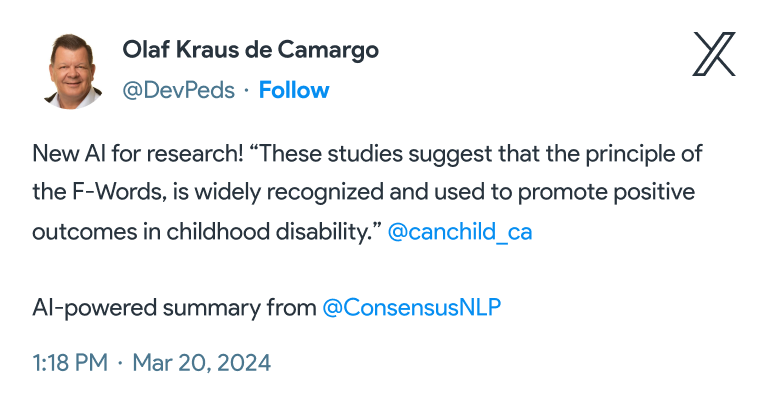
"It's not every day I find a tool that truly helps with my work. Consensus blew me away when I started using it, I was learning things I had never encountered before. This is an AI product that isn't hype."

"I can make sense of what’s out there a lot faster with Consensus. I jump into different topics with the summary & Copilot before diving deeper. The interface makes it so easy to review individual papers and see what they’re about."

Consensus has been featured in
Consensus vs ChatGPT
ChatGPT predicts the most likely language that should follow. Consensus helps you find & understand the best science, faster.
Results directly connected to scientific papers
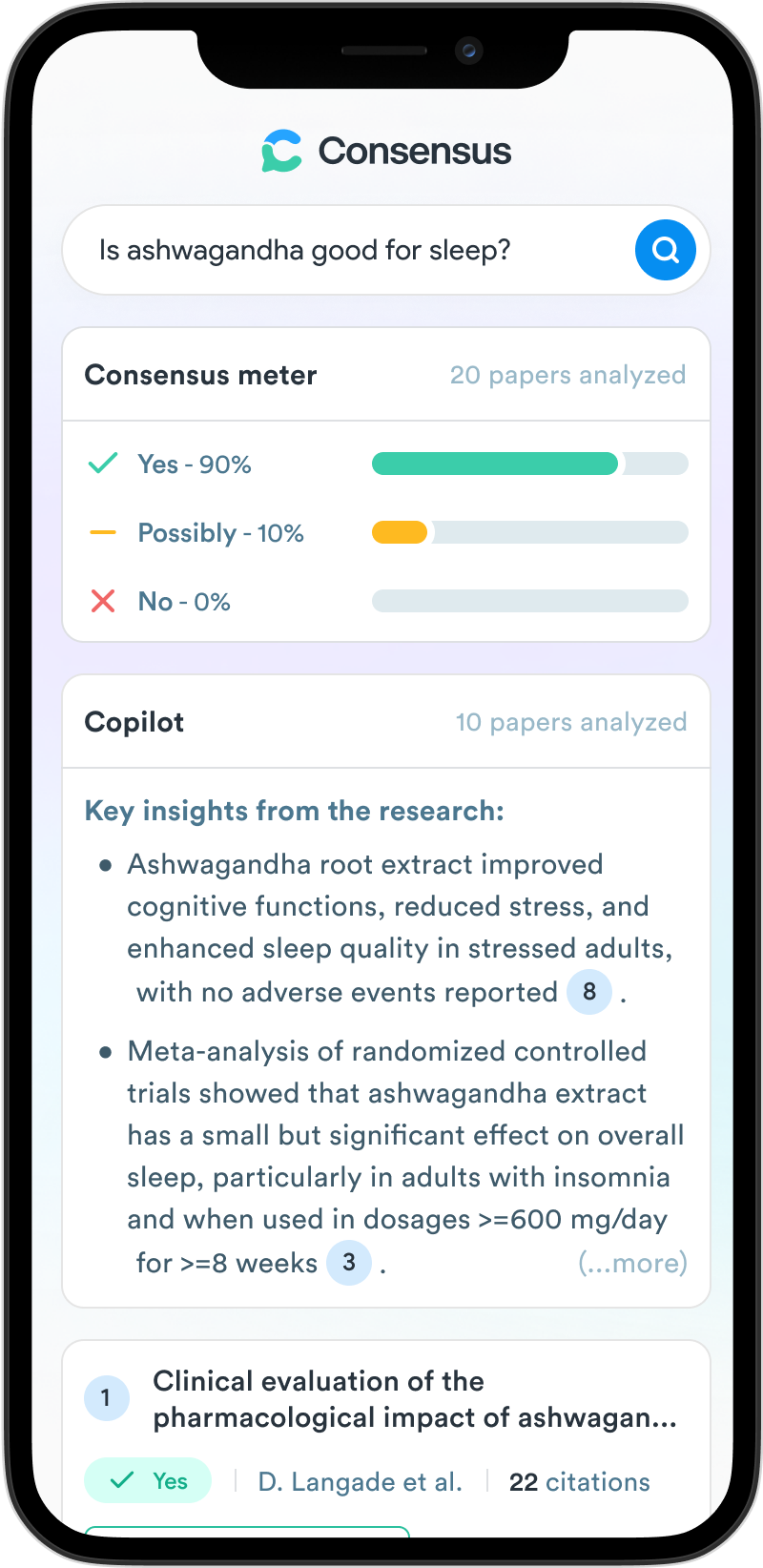
Fully machine-generated, prone to hallucinations
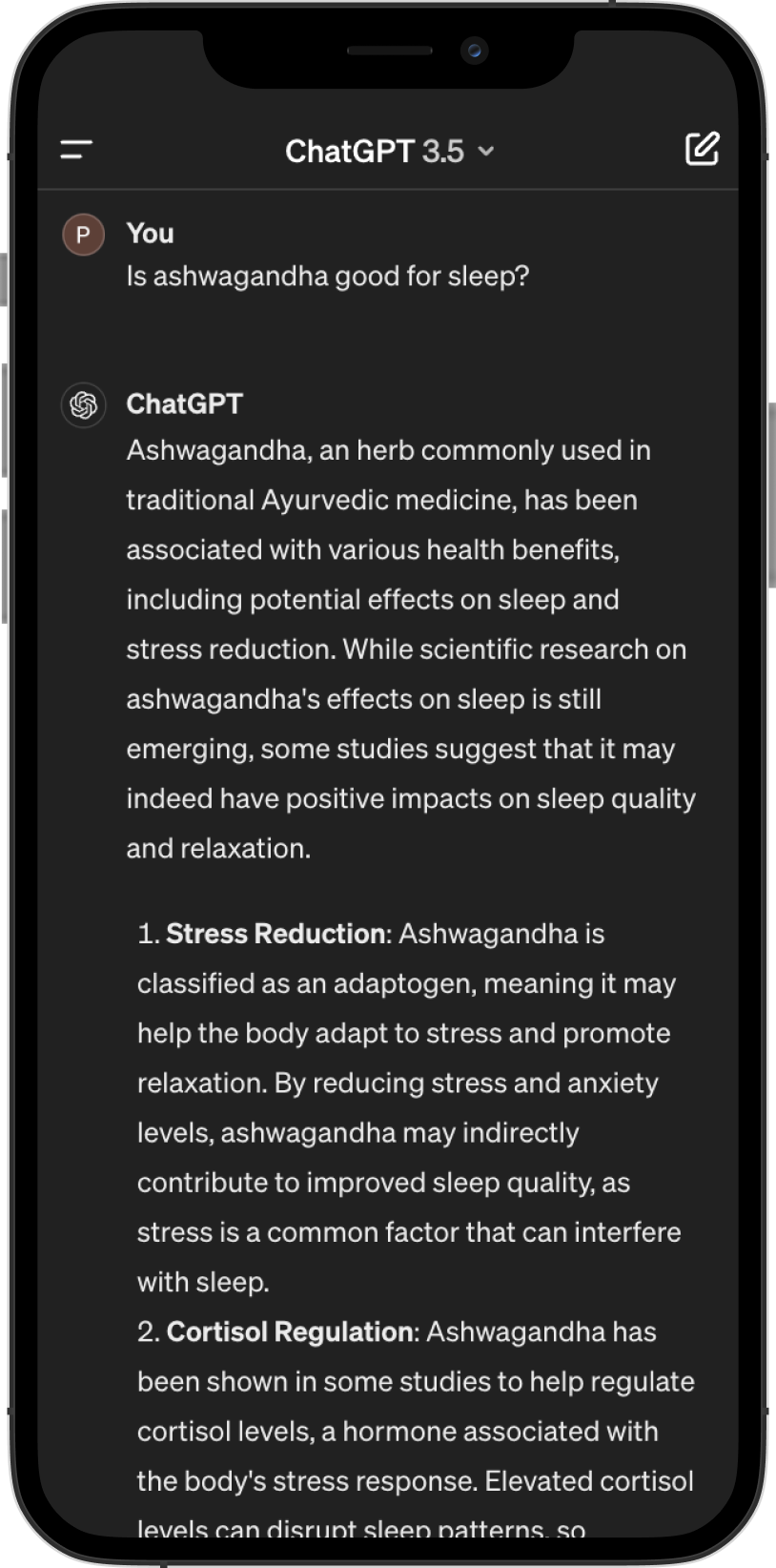
Consensus academic features

Consensus Meter
Quickly see the scientific consensus & gain topic context and direction. See exactly which papers were included.

Simply include in your search - ask Copilot to adopt a style, draft content, format, create lists, and more. Read a referenced topic synthesis.

Paper-level Insights
We extract key insights and answers. Locate the most helpful papers and digest their insights faster.

Search Filters
Filter by sample size, study design, methodology, if the paper is open access, a human or animal study (and many more filters).

Quality Indicators
Focus on the best papers - intuitive labels for citations, journal quality, and study type.

Study Snapshot
Our Study Snapshot quickly shows key information like Population, Sample size, Methods, etc. - all within the results page.
How we created the ultimate search engine for science
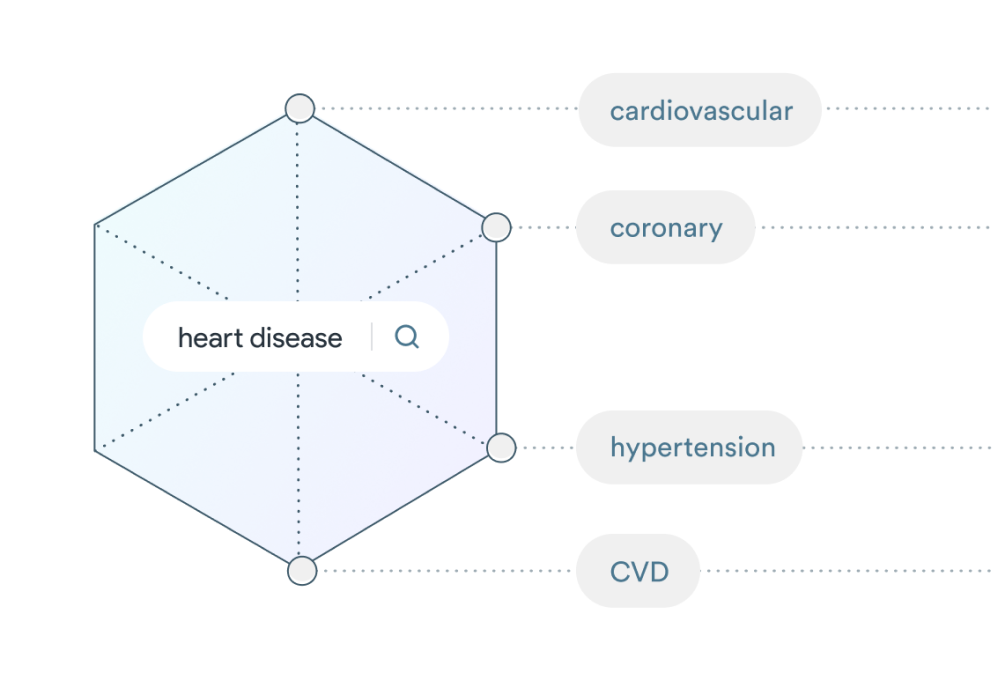
Search: Find the best papers
Purpose-built academic & vector search functionality. Consensus utilizes important factors like study design, sample size, population details, and more to rank the best research higher.
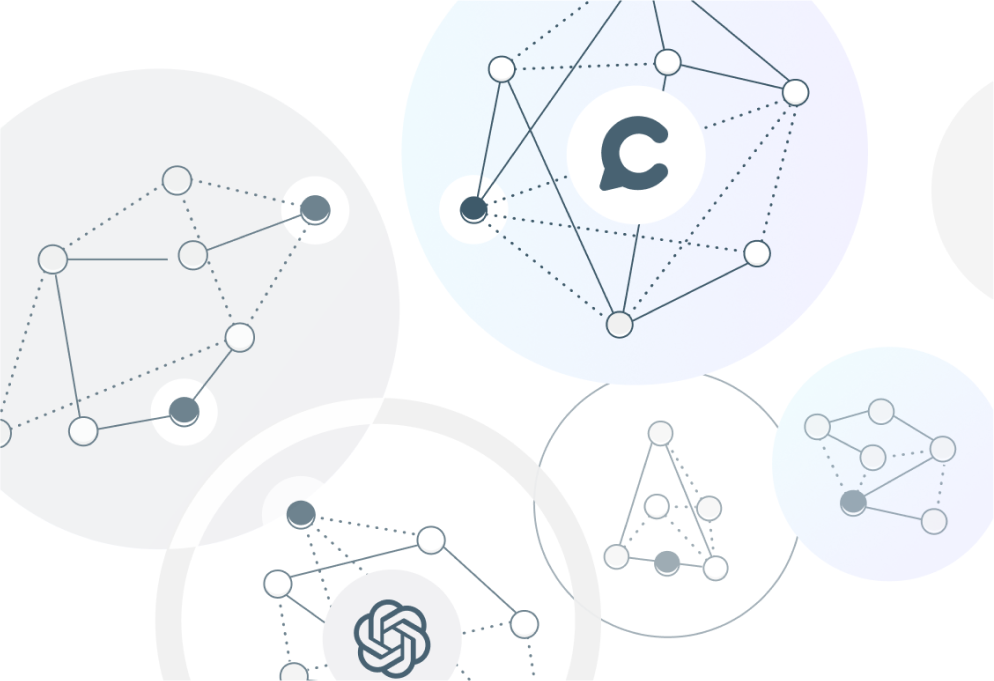
Dedicated research LLMs
Our proprietary LLMs read research like an expert - we also leverage the best-in-class models from OpenAI. Consensus generates AI insights at both the search and paper level.
Open Access Theses and Dissertations
Thursday, April 18, 8:20am (EDT): Searching is temporarily offline. We apologize for the inconvenience and are working to bring searching back up as quickly as possible.
Advanced research and scholarship. Theses and dissertations, free to find, free to use.
Advanced search options
Browse by author name (“Author name starts with…”).
Find ETDs with:
Written in any language English Portuguese French German Spanish Swedish Lithuanian Dutch Italian Chinese Finnish Greek Published in any country US or Canada Argentina Australia Austria Belgium Bolivia Brazil Canada Chile China Colombia Czech Republic Denmark Estonia Finland France Germany Greece Hong Kong Hungary Iceland India Indonesia Ireland Italy Japan Latvia Lithuania Malaysia Mexico Netherlands New Zealand Norway Peru Portugal Russia Singapore South Africa South Korea Spain Sweden Switzerland Taiwan Thailand UK US Earliest date Latest date
Sorted by Relevance Author University Date
Only ETDs with Creative Commons licenses
Results per page: 30 60 100
October 3, 2022. OATD is dealing with a number of misbehaved crawlers and robots, and is currently taking some steps to minimize their impact on the system. This may require you to click through some security screen. Our apologies for any inconvenience.
Recent Additions
See all of this week’s new additions.
About OATD.org
OATD.org aims to be the best possible resource for finding open access graduate theses and dissertations published around the world. Metadata (information about the theses) comes from over 1100 colleges, universities, and research institutions . OATD currently indexes 6,911,340 theses and dissertations.
About OATD (our FAQ) .
Visual OATD.org
We’re happy to present several data visualizations to give an overall sense of the OATD.org collection by county of publication, language, and field of study.
You may also want to consult these sites to search for other theses:
- Google Scholar
- NDLTD , the Networked Digital Library of Theses and Dissertations. NDLTD provides information and a search engine for electronic theses and dissertations (ETDs), whether they are open access or not.
- Proquest Theses and Dissertations (PQDT), a database of dissertations and theses, whether they were published electronically or in print, and mostly available for purchase. Access to PQDT may be limited; consult your local library for access information.
Dissertations, Doctoral Projects, and Theses - Search Engines
When submitting your work to ProQuest, you will choose whether or not you want your work to be indexed and discoverable by Google Scholar and major search engines.
Note that the information below applies only to discoverability through ProQuest. Scholars and researchers will always be able find your thesis or dissertation in DigitalGeorgetown through Google Scholar and major search engines, subject to any approved embargoes .
If you prefer not to have ProQuest make your work discoverable through search engines, during the ProQuest ETD Administrator submission process, choose the option "I DO NOT want my work to be discoverable in ProQuest through Google Scholar and other major search engines." This option appears on the Publishing Options page -- choose "Show More" in the Search Engine Discovery section for it to appear on your screen.

Thesis and Dissertation Guide
- Starting your Dissertation/Thesis
- Dissertation/Thesis Resources
- Books That May Help
- Literature Reviews
- Annotated Bibliography
- We Don't Have It? / Interlibrary Loan
- Online Learning Study Tips
- Search Strategy
- Advanced Search Techniques
- Kemp Library Video Tutorials
- Find Articles / Journals / Databases
- What are...
- Database Video Tutorials
- Peer Reviewed
- How to confirm and cite peer review
- Primary/Secondary Sources
- Other Types of Sources (i.e. Newspapers)
- Legal Research Resources
- Evidence Based Practice/Appraisal Resources
- Google Scholar
- Website Evaluation
- Internet Searching
- Apps You Didn't Know You Needed
- Who is citing me?
- Questions After Hours
- ESU Thesis Submission
- ESU Dissertation Submission
This page goes over what an academic search is, different levels of search strategy (how to form a specific search, how to structure that for your assignment, etc.), how to create an effective search in a database/search engine/anywhere, why search terms matter, how to effectively review your search results, and the structure of a journal article. This page also provides a tracking sheet that can be used to help remember all the different steps and directions you go in your research.
Search Strategy (visual)

The Search Strategy Process

What are the parts of an article?
Search strategy and tips.
- Getting Started
- Keeping Track of Your Search
- Sample Search
- Why are search terms important?
- Adding Concepts
- Reviewing Results
- Is this Article Right for Me?
- Conceive : what’s the assignment? What will your topic be?
- Organize : what are you looking for? Historical information, current information, statistical data, peer reviewed article?
- Keywords : break your topic down into keywords or concepts. Once you have keywords, find synonyms for those words and phrases. How can you combine them?
- Start Broad : start your searching with one or two keywords (broad topic) and narrow your search as you go with additional terms, altering what years of publication you’re looking for, only looking at peer reviewed articles, etc.
- If you’re not finding anything exact, find something close and try those keywords and subjects
- Reassess : if you’re not getting the results you’re looking for, you may need to change your searches, broaden or narrow your topic, or change your topic. Ask for help if you’re not sure what your best option is.
- Restart: research is a cyclical process, you may need to start from scratch or just from an earlier step like choosing new keywords.
- Research Tracking Sheet
Keep track of your search and your results. Remember research is a process and you may try many things before you find what works best for your topic. If you think of it like troubleshooting a problem on your computer that might help.
Keep track of your search terms and jot down other words you find while perusing the articles that result from your searches.
The " search history " option under the search box can also help with that.
Email, print, or save articles that might be useful for your research, even if you're not sure that you're going to use them.
This sample topic is used to demonstrate how to pull out keywords and critically assess your topic.
If your topic is:
What is the influence of Spanish literary custom on Medieval lyric poetry?
1. Identify keywords or phrases:
Spain(ish) literature culture Medieval lyric poetry
2. Explore synonyms for your keywords/phrases:
Medieval: Middle Ages, Dark Ages, Gothic
Culture: customs, tradition, practices
3. Use these terms in your search. Combine the synonyms with the word "or".
For example: Medieval OR Middle Ages OR Dark Ages OR Gothic
4. Make use of the Subject Headings option on the left of your screen to find appropriate subject headings for your topic and use them in a search
Note : some of your initial keywords may be similar like literature and lyric poetry . Other keywords you could use for either of these terms: literary, poems, lyric poems, prose or because we are disucssing Spanish literary customs from a specific time period, you can use non-English terms such as " kharjas " or " Mester de Juglaria ". You could also look at specific famous poems such as Cantar de Mio Cid or Mester de Clerecia .
Use unique, specific terms. If you're researching a subject with a unique vocabulary, don't be afraid to use those terms. It's the difference between searching " ocelot " (8,490,000 results in Google) and " Leopardus pardalis " (387,000 results in Google). That's over an 8 million result difference.
By using specific and/or unique terms, you are likely to find more relevant information. It is also likely to be of a higher quality, as most people don't use professional vocabulary casually.
Remember to search in the advanced search mode
Enter your 1st keyword(s)/phrase(s) in the first line (using our sample search from two tabs ago, Medieval or Middle Ages ).
Your second concept in our example is culture . Enter that key phrase and any synonyms in the second line of the search box. Your search results should then include both concepts somewhere in the record.
You can add as many concepts as you like - all databases and the library catalog will allow you to add more than the default 3 fields when you're in advanced search.
Below you see an example of combining 2 concepts with multiple keywords in a database.

Once you have collected some articles, take a closer look at them.
- Read and review what you have. Do you have enough information to support your topic?
- If you don't like what you have or you don't have enough good information, go back to your search. Try some new keywords or a different database.
- Explore some of the subject headings from the articles that you do want to use.
- If some of your articles have citations you might want to look at some of the sources listed there.
- If you're stuck -- ask a librarian for help.
Reading these sections of an article/book will help you determine if the item you're looking at is relevant to your research. The title, abstract and discussion/conclusion are usually all you really need to read from an article to see if you can use it.
- Abstract : This is a summary of the article/item and will give you a good idea if it will be of use. This is the only part that will be in the item record and in the article.
- Introduction : This will tell you the history of the topic and the goal(s) of what you’re reading.
- Literature Review : Summary of similar or previous research on the topic. *May not be included.
- Methodology : How did they approach the topic/their research? *May not be included.
- Results : Lists and discusses what the research discovered. *May not be included.
- Discussion/Conclusion : The results of what they found and their implications.
- << Previous: Refresher Research Course
- Next: Advanced Search Techniques >>
- Last Updated: Apr 29, 2024 12:07 PM
- URL: https://esu.libguides.com/thesis

IMAGES
VIDEO
COMMENTS
You may also want to consult these sites to search for other theses: Google Scholar; NDLTD, the Networked Digital Library of Theses and Dissertations.NDLTD provides information and a search engine for electronic theses and dissertations (ETDs), whether they are open access or not. Proquest Theses and Dissertations (PQDT), a database of dissertations and theses, whether they were published ...
Google Scholar provides a simple way to broadly search for scholarly literature. Search across a wide variety of disciplines and sources: articles, theses, books, abstracts and court opinions.
Get 30 days free. 1. Google Scholar. Google Scholar is the clear number one when it comes to academic search engines. It's the power of Google searches applied to research papers and patents. It not only lets you find research papers for all academic disciplines for free but also often provides links to full-text PDF files.
Global ETD Search. Search the 6,481,602 electronic theses and dissertations contained in the NDLTD archive: advanced search tips how to contribute records.
EBSCO Open Dissertations is a collaboration between EBSCO and BiblioLabs to increase traffic and discoverability of ETD research. You can join the movement and add your theses and dissertations to the database, making them freely available to researchers everywhere while increasing traffic to your institutional repository.
Table of Contents. #1. Google Scholar. Google Scholar is an academic search engine that indexes the full text or metadata of scholarly literature across an array of publishing formats and disciplines. Great for academic research, you can use Google Scholar to find articles from academic journals, conference proceedings, theses, and dissertations.
Over the last 80 years, ProQuest has built the world's most comprehensive and renowned dissertations program. ProQuest Dissertations & Theses Global (PQDT Global), continues to grow its repository of 5 million graduate works each year, thanks to the continued contribution from the world's universities, creating an ever-growing resource of emerging research to fuel innovation and new insights.
Research Policy Adviser. Aggregation plays an increasingly essential role in maximising the long-term benefits of open access, helping to turn the promise of a 'research commons' into a reality. The aggregation services that CORE provides therefore make a very valuable contribution to the evolving open access environment in the UK.
The ProQuest Dissertations & Theses Global (PQDT) ™ database is the world's most comprehensive curated collection of multi-disciplinary dissertations and theses from around the world, offering over 5 million citations and 3 million full-text works from thousands of universities. Within dissertations and theses is a wealth of scholarship, yet ...
Google Scholar provides a simple way to broadly search for scholarly literature. From one place, you can search across many disciplines and sources: articles, theses, books, abstracts and court ...
Microsoft Academic Search: Harvests theses and dissertations from virtually all registered open-access repositories. ... Africa, and Latin America : International: BASE (Bielefeld Academic Search Engine) Portal to 70 million documents in 3000 repositories. Use Advanced Search to restrict queries to theses and dissertations. International: Open ...
More than 340 mio. scientific documents from more than 11.000 content providers. BASE is one of the world's most voluminous search engines for academic web resources.
The Networked Digital Library of Theses and Dissertations (NDLTD) is an international organization dedicated to promoting the adoption, creation, use, dissemination, and preservation of electronic theses and dissertations (ETDs). We support electronic publishing and open access to scholarship in order to enhance the sharing of knowledge worldwide.
Search engine for full-text theses from more than 200 universities in more than a dozen European countries. Networked Digital Library of Theses and Dissertations (NDLTD) An "international organization dedicated to promoting the adoption, creation, use, dissemination, and preservation of electronic theses and dissertations (ETDs)."
CAS DSpcase Thesis. The College of Arts and Sciences eTheses Repository is a web-based service for the management and dissemination of electronic theses and dissertations. The system also provides self-archiving, and access for global visibility of the college scholarly research and to store and preserve other digital assets.
BASE (Bielefeld Academic Search Engine) - Ensure only the Theses option is ticked. If a link to fulltext fails try the Google Scholar option in the record to see if an alternative source is available. Google Scholar - Although searches cannot be limited to theses, Google Scholar is an effective search tool for finding a specific thesis.
Consensus is a new breed of academic search engine, powered by AI, grounded in science. Find the best papers while getting instant insights and topic synthesis. Product Product. Product. Universities & Students ... Purpose-built academic & vector search functionality. Consensus utilizes important factors like study design, sample size ...
You may also want to consult these sites to search for other theses: Google Scholar; NDLTD, the Networked Digital Library of Theses and Dissertations.NDLTD provides information and a search engine for electronic theses and dissertations (ETDs), whether they are open access or not. Proquest Theses and Dissertations (PQDT), a database of dissertations and theses, whether they were published ...
ProQuest enables dissertations and theses to be indexed in Google Scholar to support discovery of this valuable work and ultimately improve research outcomes for scholars. An authenticated ProQuest dissertations user searching Google Scholar will be recognized by the ProQuest platform and connect to the full text in their library's collection ...
For example, if I want to search for dissertations related to convex optimization, the following search terms in Google Scholar "convex optimization" dissertation site:edu. returns many useful results. In the above example, the search is restricted to those institutions that are archiving their dissertations on the .edu domain.
Scholars and researchers will always be able find your thesis or dissertation in DigitalGeorgetown through Google Scholar and major search engines, subject to any approved embargoes. If you prefer not to have ProQuest make your work discoverable through search engines, during the ProQuest ETD Administrator submission process, choose the option ...
If my assumption is correct they get published as well, is there a primary search engine for that? Specifically I am interested in comp. science and information systems mgmt topics. publications; phd; thesis; Share. ... Search all Theses online; Share. Improve this answer. Follow edited Mar 15, 2018 at 0:01. answered Mar 14, 2018 at 0:44. Ben ...
This page goes over what an academic search is, different levels of search strategy (how to form a specific search, how to structure that for your assignment, etc.), how to create an effective search in a database/search engine/anywhere, why search terms matter, how to effectively review your search results, and the structure of a journal article.